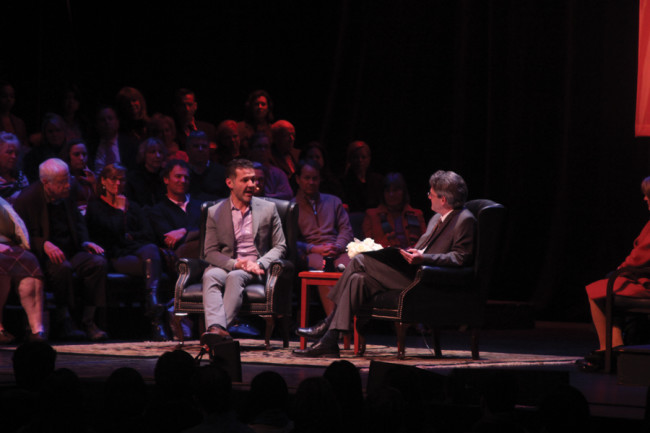
A nearly full house in McFarlin Auditorium was graced with the literary words of wisdom of bestselling author of “The Kite Runner,” Dr. Khaled Hosseini, at Tuesday’s Tate Lecture Series.
Speaking about his writing process for his three novels, which include “A Thousand Splendid Suns” and more recently “And the Mountains Echoed,” Hosseini invited students, faculty and Dallas patrons to join him and The Dallas Morning News Assistant Arts and Features Editor, Micheal Merschel on an exploration of creative writing and Afghan history.
“I hope that my books have helped segue, have been a kind of window into the country, to make it more human, more relatable than seeing it on the television as a news story,” Hosseini said.
The son of an Afghan diplomat, Hosseini fled Afghanistan at the age of 11 and found a home in California after seeking refuge in the United States at 15. Not speaking a word of English, Hosseini enrolled in American high school just two weeks after arriving in the States.
“To say that [my success] is unexpected is a massive understatement. I wanted to write from the time that I was a boy but that I managed somehow make that come true in my third language and to connect with the number of people that I have is really miraculous,” Hosseini said.
For a trilingual who started his career as a physician, Hosseini’s success still comes as a surprise to the author himself.
“About a year after ‘The Kite Runner,’ I started seeing people reading it at the airport and at Starbucks and it was weird. It freaked me out,” Hosseini said.
But after resigning from medicine in December of 2004, Hosseini has committed to his writing as a way of life.
“I’ve always written because there was something inside of me that I wanted to explore,” the author said.
It makes sense then that all three of his books have revolved around a country and a population that is near to his heart: Afghanistan.
“Who was it that said that all writing is autobiography at the end of the day? You’re writing about stuff that you feel, that you think, that feels true to you,” Hosseini said. “There are bits and pieces of me all over my books. I think there is an element of guilt that is a recurring theme in my books. I know it has to do with my life.”
First-year Laura Kohner noted that Hosseini’s passion comes out not only in his writing, but in his speech as well.
“He was speaking from the perspective of someone who identifies with both Afghan and American culture. He considers himself truly a mix of the two and he is still weighing the two sides of himself,” she said.
As the United Nations High Commissioner for Refugees’ Goodwill envoy and the founder of the Khaled Hosseini Foundation, which provides humanitarian assistance to the people of Afghanistan, Hosseini continues to connect with his homeland.
“The foundation gives me the opportunity to reach those people that are just like the characters in my books,” the author said.
As students and patrons asked Hosseini about the future of the country after the United States’ involvement ends, the author articulately described his thoughts on the next step for his country of origin.
“Our country is a mixed picture of tangible advances met with disappointment. But, I have hope. Afghanistan is a young country, not in history, but in youth,” Hosseini said. “The young people are interested in engaging with the outside world, the Western world, the Asian world. They’re importing new ideas and technology and I’m hopeful it will affect change.”








